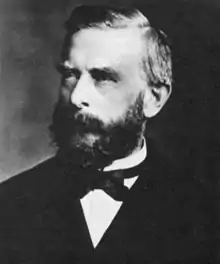Wilhelm Peters
Wilhelm Karl Hartwich (or Hartwig) Peters (22 April 1815 in Koldenbüttel – 20 April 1883) was a German naturalist and explorer.
Wilhelm Peters | |
|---|---|
 | |
| Born | 22 April 1815 |
| Died | 20 April 1883 (aged 67) |
| Nationality | German |
| Known for | Explorer, zoologist |
_Reniala.jpg.webp)
He was assistant to the anatomist Johannes Peter Müller and later became curator of the Berlin Zoological Museum. Encouraged by Müller and the explorer Alexander von Humboldt, Peters travelled to Mozambique via Angola in September 1842, exploring the coastal region and the Zambesi River. He returned to Berlin with an enormous collection of natural history specimens, which he then described in Naturwissenschaftliche Reise nach Mossambique... in den Jahren 1842 bis 1848 ausgeführt (1852–1882). The work was comprehensive in its coverage, dealing with mammals, birds, reptiles, amphibians, river fish, insects and botany. He replaced Martin Lichtenstein as curator of the museum in 1858, and in the same year he was elected a foreign member of the Royal Swedish Academy of Sciences. In a few years time, he greatly increased the Berlin Museum's herpetological collection to a size comparable to those of Paris and London. Herpetology was Peters' main interest, and he described 122 new genera and 649 species from around the world.[1][2]
Eponyms
Wilhelm Peters is commemorated in the scientific names of several species of reptiles, including Andinosaura petrorum, Anolis petersii, Geophis petersii, Hebius petersii, Morenia petersi, and Tracheloptychus petersi.[3]
He is also commemorated in the specific name of an African freshwater elephantfish, Gnathonemus petersii, known commonly as Peters' elephantnose fish.
Peters Bay in NE Greenland was named after him by Carl Koldewey during the 1869–1870 Second German North Polar Expedition.[4]
Author abbreviation
Sometimes, W. Peters is used to prevent confusion with herpetologists Günther Peters and James A. Peters.
Works
- Naturwissenschaftliche Reise nach Mossambique. Band 1: Zoologie / Säugethiere . Reimer, Berlin 1852 Digital edition by the University and State Library Düsseldorf
- Naturwissenschaftliche Reise nach Mossambique. Band 2: Zoologie / Vögel . Reimer, Berlin [1883] Digital edition by the University and State Library Düsseldorf
- Naturwissenschaftliche Reise nach Mossambique. Band 3: Zoologie / Amphibien . Reimer, Berlin 1882 Digital edition by the University and State Library Düsseldorf
- Naturwissenschaftliche Reise nach Mossambique. Band 4: Zoologie / Flußfische . Reimer, Berlin 1868 Digital edition by the University and State Library Düsseldorf
- Naturwissenschaftliche Reise nach Mossambique. Band 5: Zoologie / Insecten und Myriopoden . Reimer, Berlin 1862 Digital edition by the University and State Library Düsseldorf
- Naturwissenschaftliche Reise nach Mossambique. Botanik Abth. 1 . Reimer, Berlin 1862 Digital edition by the University and State Library Düsseldorf
- Naturwissenschaftliche Reise nach Mossambique. Botanik Abth. 2 . Reimer, Berlin 1864 Digital edition by the University and State Library Düsseldorf
References
- Adler, Kraig (1989). Contributions to the History of Herpetology. Society for the Study of Amphibians and Reptiles. ISBN 978-0-916984-19-9.
- "George Glazer Gallery - Antique Monkey Prints - Peters Monkey Studies". www.georgeglazer.com. Retrieved 2017-07-19.
- Beolens, Bo; Watkins, Michael; Grayson, Michael (2011). The Eponym Dictionary of Reptiles. Baltimore: Johns Hopkins University Press. pp. 204–205. ISBN 978-1-4214-0135-5.
- "Catalogue of place names in northern East Greenland". Geological Survey of Denmark. Retrieved 7 August 2019.
- "The Code Online". International Commission of Zoological Nomenclature.